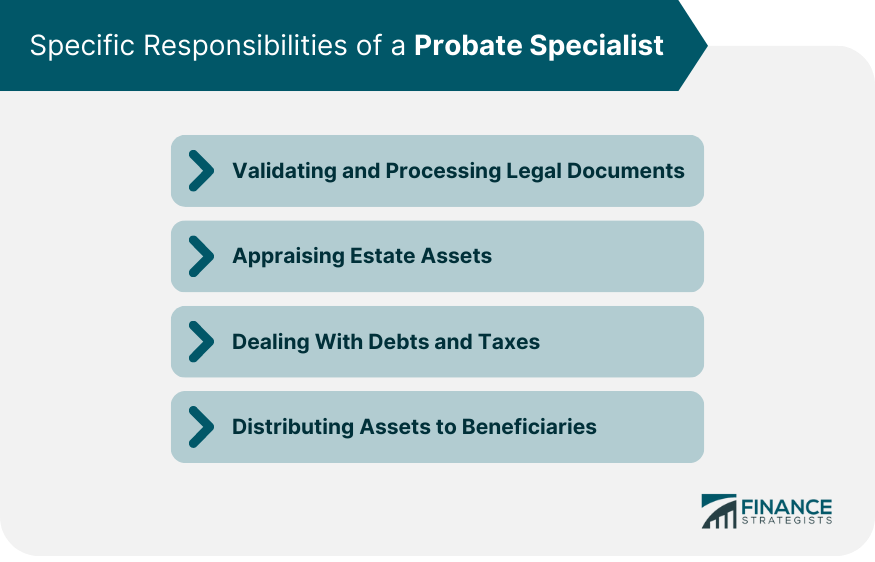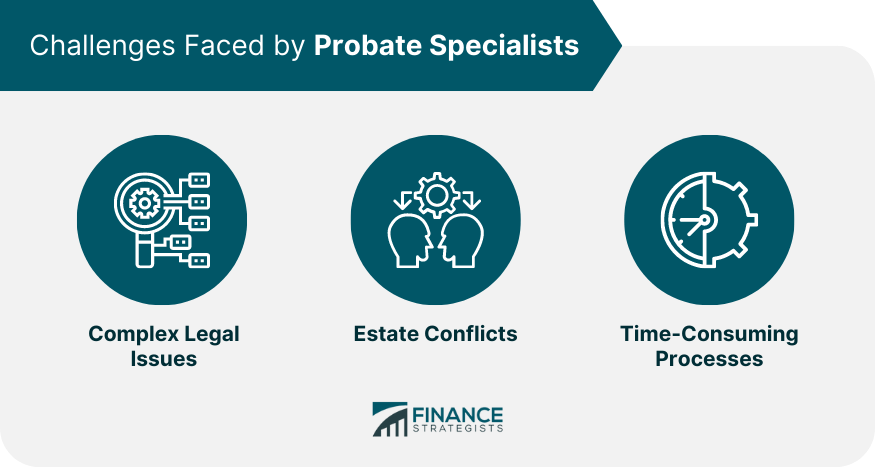Probate specialists are professionals who specialize in the legal process that ensures an estate's assets are properly distributed following the death of the owner. This process, known as probate, involves validating the deceased person's will, appraising the deceased's assets, paying off their debts and taxes, and overseeing the distribution of remaining assets to the rightful beneficiaries. The complexity of probate law, which varies by jurisdiction, requires specialists to have in-depth knowledge and understanding of this area of law. In addition to their technical expertise, probate specialists must possess strong communication and negotiation skills to handle potential disputes among beneficiaries and other involved parties. In essence, the role of a probate specialist is to ensure a smooth, legal, and fair distribution of a deceased person's estate, providing invaluable assistance to executors of wills and beneficiaries during a challenging time. Primarily, they must confirm the authenticity of the last will and testament, which can be a multi-step process. Firstly, they need to verify that the testator was mentally competent at the time of the will's creation, ruling out any influence of conditions like dementia or undue pressure from third parties. They must also confirm that the will was signed and witnessed according to the relevant laws in the jurisdiction, which often requires two adult witnesses who aren't beneficiaries of the will. Moreover, probate specialists have to deal with numerous other documents, including death certificates, asset documentation, debt paperwork, and tax forms. Ensuring all paperwork is correct and up-to-date is critical in avoiding potential disputes and delays in the probate process. After the will has been authenticated, the specialist must then catalog and value the deceased's assets. These assets can be diverse and numerous, including real estate properties, vehicles, jewelry, artwork, financial investments, and even digital assets like cryptocurrency. The process involves thorough investigation, sometimes requiring the help of professional appraisers for certain assets, such as real estate and unique valuables. Having a comprehensive and accurate appraisal of the estate is essential to ensure a fair distribution among beneficiaries and to calculate any estate or inheritance taxes due. Probate specialists need to identify all the creditors the decedent owed money to, which may include credit card companies, mortgage lenders, or personal loan providers. In parallel, probate specialists must file the decedent's final income tax return and calculate and pay any inheritance or estate taxes that are due. This part of their job requires deep understanding of tax laws to avoid mistakes and ensure no unnecessary taxes are levied on the estate or beneficiaries. Probate specialists work closely with the estate's executor (if one is appointed) and maintain transparent communication with all beneficiaries to ensure everyone is clear on the process and the timing. This part of the probate process can be emotionally charged and occasionally contentious if there are disputes among beneficiaries. Probate specialists need to be adept at handling such situations, mediating conflicts, and ensuring a fair distribution according to the decedent's last will and testament, or according to intestate laws if no valid will exists. Typically, a Bachelor's degree is required as the starting point. Individuals might choose to major in areas such as law, business, or finance as these fields provide a strong foundation for understanding the complex nature of estates, assets, and the legalities surrounding their management. However, to specialize in probate law, many individuals choose to attend law school. A Juris Doctor (JD) degree equips future probate specialists with a broader understanding of law, laying a strong foundation for their future specialization. While in law school, they may take courses specific to estate law, taxes, and probate procedures to gain a deeper understanding of the field. Some specialists pursue further studies, such as a Master of Laws degree (LLM), focusing on estate planning or a similar field. This additional training helps them delve deeper into the nuances of probate law and estate management, setting them apart in their field. In many jurisdictions, passing the bar examination is crucial to legally practice law. However, the requirements can vary significantly from one region to another, so it's essential for individuals to familiarize themselves with the specific requirements in their locality. In addition, some choose to gain further certifications that demonstrate their expertise and commitment to the field of probate law. For instance, the National Association of Estate Planners & Councils (NAEPC) offers the Accredited Estate Planner (AEP) designation. Achieving such a designation signifies a high level of professionalism and proficiency in estate planning and related processes. Beyond formal qualifications, probate specialists also need to possess certain skills and competencies. These include strong communication skills, analytical abilities, and attention to detail. They must also have a deep understanding of probate law, tax law, and the ability to manage complex and sometimes emotional situations. Being a probate specialist is not just about understanding the law but also about applying it accurately and efficiently in different situations. Probate specialists often encounter complex legal issues such as disputes over the validity of the will, dealing with intestacy (when the deceased has left no will), handling joint ownership of assets, and dealing with creditors' claims against the estate. Family dynamics and the emotional stress of losing a loved one can exacerbate disagreements and conflicts over the decedent's assets, particularly if the deceased's will is unclear or perceived as unfair by some beneficiaries. For example, siblings might disagree on how a family home should be divided, or a beneficiary may feel slighted by their portion of the inheritance. Probate specialists need to mediate such situations, providing clear and impartial advice to all parties involved. The ability to manage such emotionally charged situations while upholding the decedent's wishes and adhering to the law is a key challenge faced by probate specialists. The probate process can be lengthy, often taking months or even years to complete. This timeline can be extended due to various factors such as the complexity of the estate, disputes among beneficiaries, or claims against the estate by creditors. Probate specialists need to manage this lengthy process efficiently, ensuring all necessary tasks are completed in a timely manner. They must handle paperwork, court appearances, communication with various parties, and the resolution of any issues that may arise. The time pressure and the requirement to keep all parties informed while managing their expectations add to the already demanding nature of their role. Probate specialists and estate lawyers, while both pivotal in the realm of estate management, fulfill distinct roles that cater to different aspects of this area. Estate lawyers primarily assist in formulating and managing comprehensive estate plans. Their work is wide-ranging and preventative, encompassing tasks such as drafting wills, setting up trusts, advising on ways to limit estate taxes, and safeguarding assets from creditors. They also provide advice on a variety of financial and legal matters including complex family or business circumstances, charitable donations, life insurance, and retirement plans. Conversely, probate specialists focus primarily on the processes following an individual's death. As previously mentioned, their work involves validating the deceased's will, appraising assets, settling debts and taxes, and executing the distribution of the remaining estate to the rightful heirs as per the will. Their expertise lies in dealing with the necessary paperwork, managing communication with all involved parties, and handling any potential disputes during the probate process. However, there are legal professionals who serve in both capacities, offering estate planning alongside probate services. Probate specialists are essential professionals who specialize in the legal process of distributing an estate's assets after the death of the owner. With their in-depth knowledge of probate law, they ensure a smooth, legal, and fair probate process. From validating legal documents to appraising estate assets, settling debts and taxes, and distributing assets to beneficiaries, probate specialists handle various responsibilities with precision and expertise. Becoming a probate specialist requires education and training in law, business, or finance, with many individuals choosing to attend law school and specialize in probate law. Certifications, such as the Accredited Estate Planner designation, further demonstrate their expertise and dedication. Despite challenges related to complex legal issues, conflicts among beneficiaries, and the time-consuming nature of the probate process, probate specialists navigate these hurdles with strong communication and mediation skills, and attention to detail. Overall, their invaluable assistance ensures a fair and efficient distribution of the estate, providing reassurance to executors and beneficiaries during a difficult time.What Is a Probate Specialist?
Specific Responsibilities of a Probate Specialist
Validating and Processing Legal Documents
Appraising Estate Assets
Dealing With Debts and Taxes
Distributing Assets to Beneficiaries

Qualifications of a Probate Specialist
Education and Training
Required Certifications
Skills and Competencies
Challenges Faced by Probate Specialists
Complex Legal Issues
Estate Conflicts
Time-Consuming Processes

Probate Specialist vs Estate Lawyer
Final Thoughts
Probate Specialist FAQs
A probate specialist is a professional who specializes in the legal process of probate. They have expertise in navigating the complexities of administering an estate after someone passes away, including managing the distribution of assets, resolving debts, and handling any disputes that may arise.
It is advisable to consider hiring a probate specialist when you find yourself responsible for handling the estate of a deceased person. If you are an executor named in a will or a family member who needs assistance with the probate process, a probate specialist can provide invaluable guidance and ensure the process is carried out correctly.
A probate specialist can offer a range of services, including but not limited to: providing legal advice and guidance throughout the probate process, assisting with the preparation of necessary documents, representing you in court if disputes arise, organizing the valuation and distribution of assets, and handling tax-related matters.
A probate specialist can help expedite the probate process by leveraging their expertise and knowledge of the legal requirements. They can ensure that all necessary paperwork is properly completed and submitted in a timely manner, reducing the chances of delays or complications. Their experience allows them to navigate the system efficiently, saving time and effort.
When hiring a probate specialist, look for someone who has a strong background in estate law, probate procedures, and related areas. Consider their experience, reputation, and any relevant certifications or memberships in professional organizations.
True Tamplin is a published author, public speaker, CEO of UpDigital, and founder of Finance Strategists.
True is a Certified Educator in Personal Finance (CEPF®), author of The Handy Financial Ratios Guide, a member of the Society for Advancing Business Editing and Writing, contributes to his financial education site, Finance Strategists, and has spoken to various financial communities such as the CFA Institute, as well as university students like his Alma mater, Biola University, where he received a bachelor of science in business and data analytics.
To learn more about True, visit his personal website or view his author profiles on Amazon, Nasdaq and Forbes.















